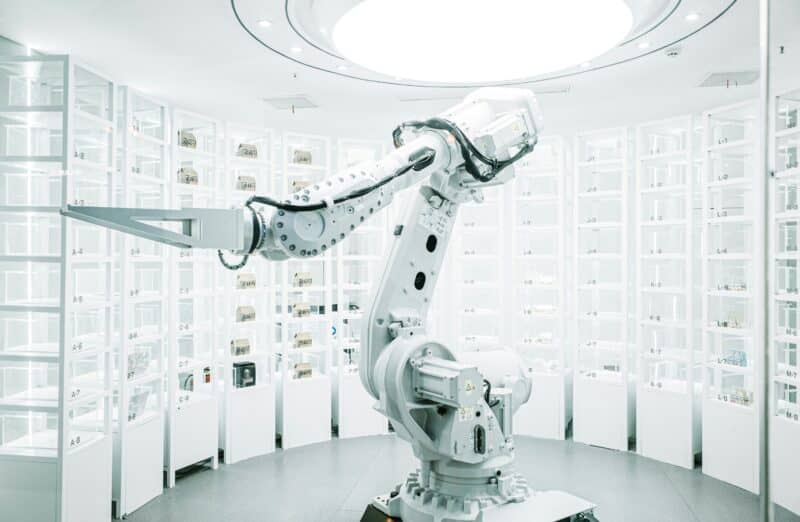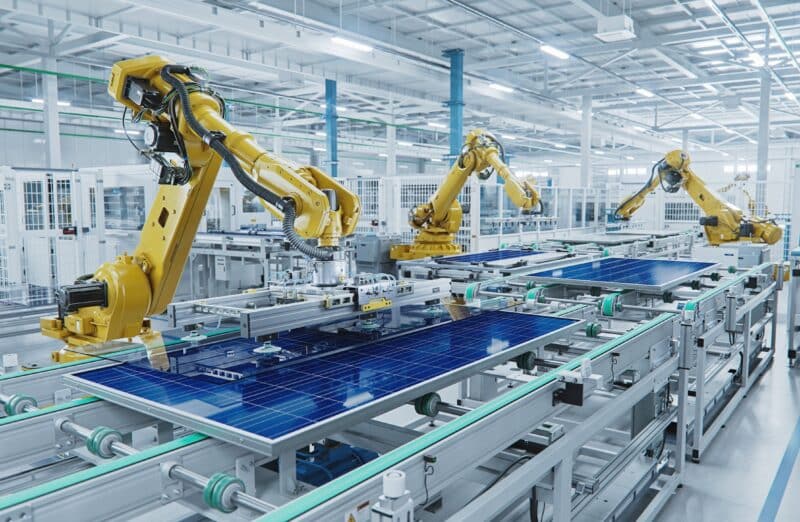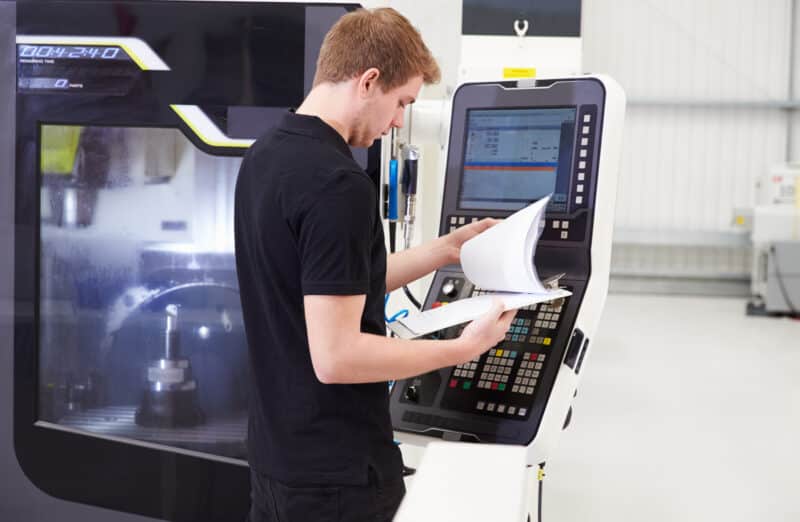Electronics and High Tech Manufacturing
Semiconductors, robotics, and clean technology are pivotal to Lincolnshire’s growing reputation as a hub for manufacturing and engineering innovation. These industries drive technological advancement and economic growth, delivering solutions that power everyday devices, streamline industrial processes, and pave the way for a sustainable future. From designing cutting-edge electronic components to crafting intelligent robotic systems and developing renewable energy technologies, these sectors reflect a perfect balance of technical expertise, creativity, and forward-thinking that benefits both local communities and the global economy.

This exciting field offers a range of opportunities for individuals looking to contribute to industries shaping tomorrow’s world. Whether designing semiconductors that power the latest tech, building automation systems that transform productivity, or advancing clean energy solutions to combat climate change, these sectors provide diverse and rewarding career paths for a variety of skills and interests.
Semiconductors, robotics, and clean technology in Lincolnshire focus on three distinct areas:

Semi conductors and electronics
Lincolnshire plays a significant role in the semiconductor and electronics sector, contributing to the development and production of components vital for a wide range of applications, including renewable energy systems and electric vehicles. Businesses in the region are known for their expertise in creating high-performance semiconductors, ensuring rigorous quality standards, and driving advancements in electronic technologies that meet global demands.
Working in semiconductor and electronics businesses offers opportunities in roles such as electronics engineers, quality assurance specialists, and process technicians. Daily responsibilities might include designing integrated circuits, performing detailed performance tests, or collaborating on innovative electronic solutions. This field is ideal for detail-oriented individuals who are passionate about technology and eager to contribute to cutting-edge innovations.

Robotics and automation businesses
The robotics and automation sector in Lincolnshire is at the forefront of developing advanced systems that make processes faster, more efficient, and more precise across a variety of industries. From manufacturing to agriculture, these technologies are transforming how tasks are completed. Engineers and technicians in this field often integrate artificial intelligence (AI) and machine learning into robotic systems, enabling machines to adapt to new tasks, learn from data, and perform complex functions with minimal human intervention. These innovations not only enhance productivity but also reduce waste, improve safety, and create sustainable solutions for businesses.
Careers in robotics and automation offer a wide range of roles, including robotics engineers who design and build robotic systems, automation specialists who develop software to control machines, and systems integrators who ensure all components work seamlessly together.
This sector is ideal for individuals who are curious about how things work, enjoy solving problems, and are excited about cutting-edge technology. The practical applications of robotics and automation mean that every project can have a tangible impact, whether it’s creating precision farming, faster production lines or developing tools that improve everyday life.

Energy and clean technology
The energy and clean tech sector in Lincolnshire is leading the way in the UK’s renewable energy transformation. With a strong focus on wind energy, solar power, and bioenergy systems, the region is driving the adoption of sustainable technologies that help reduce environmental impact. Whether it’s harnessing wind power, developing innovative solar technologies, or creating bioenergy systems from organic materials, this sector plays a vital role in supporting the shift to a greener economy.
In addition to generating renewable energy, the sector focuses on designing efficient energy storage solutions and constructing the infrastructure needed to support these advancements. From wind turbines dotting the skyline to solar panels on rooftops, these projects demonstrate Lincolnshire’s commitment to sustainability and its contribution to addressing global energy challenges.
Careers in energy and clean tech offer a wide variety of roles, such as renewable energy engineers, who design and improve systems like wind turbines or solar arrays, environmental consultants, who help businesses meet sustainability targets, and project managers, who oversee the construction of renewable energy facilities. Professionals in this sector might work on tasks like optimising energy systems for greater efficiency, ensuring compliance with environmental regulations, or planning large-scale renewable energy installations.
This field is perfect for individuals passionate about sustainability and wanting to make a meaningful impact on the environment. With rapid growth and increasing demand for clean energy solutions, the energy and clean tech sector offers exciting career opportunities for those eager to advance innovative and environmentally friendly technologies.
Check out the different roles in this sector below

Management and coordination
Management and coordination roles are essential in the manufacturing and engineering sector, ensuring projects run smoothly and meet high-quality standards. Professionals in these roles oversee production schedules, manage budgets, and coordinate teams to deliver results on time. Day-to-day tasks include supervising operations, liaising with stakeholders, and troubleshooting logistical challenges. Whether managing a production line or coordinating the development of new technologies, these roles combine strategic planning with hands-on problem-solving.
Key roles: Operations manager, project manager, engineering manager, quality assurance manager, supply chain manager.
Skills & attributes: Strategic thinking, leadership, organisational skills, problem-solving, communication, attention to detail, knowledge of industry regulations.
Scorecard
Salary Potential*
Flexible Hours
Flexible Location
Physicality
*based on a 40-hour working week

Engineering and design
Engineering and design professionals bring innovation and precision to manufacturing and engineering projects. These roles involve developing blueprints, designing systems, and ensuring products meet technical, safety, and environmental standards. Daily tasks include using CAD software, conducting feasibility assessments, and collaborating with teams to refine designs. Engineers and designers play a vital role in creating functional, efficient, and innovative solutions across industries.
Key roles: Electronics engineer, mechanical engineer, design engineer, control systems engineer, CAD technician.
Skills & attributes: Creativity, technical expertise, analytical thinking, teamwork, attention to detail, proficiency in design software.
Scorecard
Salary Potential*
Flexible Hours
Flexible Location
Physicality
*based on a 40-hour working week

Production and skilled roles
Production and skilled roles are the hands-on positions that bring projects to life. These professionals operate machinery, assemble products, and ensure the smooth running of production lines. Tasks include interpreting technical drawings, maintaining equipment, and performing quality checks. Skilled workers in this field are essential for delivering precision-engineered products that meet exacting standards.
Key roles: Assembly technician, CNC machinist, machine operator, welding technician, maintenance technician.
Skills & attributes: Manual dexterity, physical stamina, technical knowledge, adherence to safety standards, problem-solving, teamwork.
Scorecard
Salary Potential*
Flexible Hours
Flexible Location
Physicality
*based on a 40-hour working week

Inspection and maintenance
Inspection and maintenance roles ensure equipment and systems remain operational, safe, and efficient. Professionals in this field conduct routine checks, identify and repair faults, and optimise machinery for better performance. Tasks may include diagnosing technical issues, upgrading systems, and ensuring compliance with health and safety standards. These roles are critical for minimising downtime and maintaining productivity.
Key roles: Maintenance technician, quality control inspector, health and safety officer, facilities manager.
Skills & attributes: Attention to detail, technical knowledge, problem-solving, physical agility, understanding of safety regulations.
Scorecard
Salary Potential*
Flexible Hours
Flexible Location
Physicality
*based on a 40-hour working week

Specialised roles
Some roles are unique to specific manufacturing sectors, requiring specialised skills and knowledge. These positions ensure that industry-specific needs are met, such as advanced systems for aerospace or sustainable technologies for clean energy.
Renewable energy technician: Installs, maintains, and improves renewable energy systems, including wind turbines and solar panels, focusing on optimising efficiency and integrating sustainable practices.
Robotics programmer: Develops and implements code for automated systems, ensuring smooth integration with manufacturing processes. Responsibilities include troubleshooting and upgrading robotic systems to maximise productivity.
Environmental planner: Works on minimising environmental impacts of manufacturing projects, conducting assessments, and developing strategies to comply with regulations and sustainability goals.
Skills & attributes: Technical expertise, innovation, problem-solving, sector-specific knowledge, adaptability.
Scorecard
Salary Potential*
Flexible Hours
Flexible Location
Physicality
*based on a 40-hour working week

Robotics and automation roles
Robotics and automation professionals develop and maintain systems that optimise production processes. They design, program, and implement robotic systems to streamline operations and enhance efficiency. Tasks include programming robots to perform precise functions, troubleshooting automated systems, and integrating AI technologies into manufacturing lines. These professionals also analyse workflows to identify opportunities for automation, ensuring seamless integration into existing processes. By combining technical expertise and innovative thinking, robotics and automation roles are pivotal in improving adaptability and driving innovation across industries.
Key roles: Robotics engineer, automation specialist, AI programmer, systems integrator.
Skills & attributes: Technical proficiency, problem-solving, programming expertise, adaptability, innovation.
Scorecard
Salary Potential*
Flexible Hours
Flexible Location
Physicality
*based on a 40-hour working week

Support services
Support service roles provide the infrastructure that keeps the manufacturing and engineering sector running smoothly. These professionals handle procurement, logistics, and compliance, ensuring resources and materials are available when needed. Daily responsibilities include managing supply chains, sourcing materials, and coordinating schedules. These roles are vital for maintaining efficiency and cost-effectiveness in operations.
Key roles: Logistics coordinator, procurement specialist, environmental planner, supply chain analyst, document controller.
Skills & attributes: Organisational skills, IT proficiency, analytical thinking, budgeting, communication.
Scorecard
Salary Potential*
Flexible Hours
Flexible Location
Physicality
*based on a 40-hour working week
In addition to hands-on roles, businesses in advanced engineering and manufacturing all rely on essential functions such as marketing, finance, procurement, IT, HR, and operations to ensure smooth and efficient operations. These departments play a crucial role in supporting electronics and high tech manufacturing, enabling these industries to thrive and drive progress in the Manufacturing and Engineering sector. For more information on these departments and the roles they offer, click here to explore further.
For information on local courses and qualifications that could support your career in this field, please click here.

